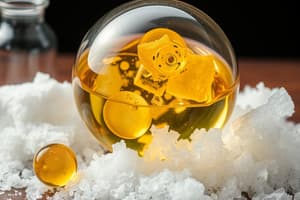Podcast
Questions and Answers
What is the term used by scientists to refer to everything in the universe?
What is the term used by scientists to refer to everything in the universe?
- Matter (correct)
- Elements
- Mass
- Particles
Which ancient philosophers classified matter into five basic elements known as 'Panch Tatva'?
Which ancient philosophers classified matter into five basic elements known as 'Panch Tatva'?
- Egyptian philosophers
- Greek philosophers
- Indian philosophers (correct)
- Chinese philosophers
What are the two schools of thought regarding the nature of matter?
What are the two schools of thought regarding the nature of matter?
- Solid and Liquid
- Visible and Invisible
- Continuous and Discrete (correct)
- Magnetic and Non-magnetic
Which property distinguishes matter based on its physical properties?
Which property distinguishes matter based on its physical properties?
What did early Indian philosophers believe was the fundamental composition of all things?
What did early Indian philosophers believe was the fundamental composition of all things?
What do modern-day scientists classify matter based on?
What do modern-day scientists classify matter based on?
What property of matter allows a diver to cut through water in a swimming pool?
What property of matter allows a diver to cut through water in a swimming pool?
Which characteristic of particles of matter explains why the shape of each sugar or salt crystal remains fixed?
Which characteristic of particles of matter explains why the shape of each sugar or salt crystal remains fixed?
Why does the smell of hot sizzling food reach you from several meters away compared to cold food?
Why does the smell of hot sizzling food reach you from several meters away compared to cold food?
In which state of matter do particles have the highest kinetic energy?
In which state of matter do particles have the highest kinetic energy?
What property of matter is demonstrated when a sponge can be compressed by expelling trapped air?
What property of matter is demonstrated when a sponge can be compressed by expelling trapped air?
Which property of matter is associated with the force required to break a sugar or salt crystal?
Which property of matter is associated with the force required to break a sugar or salt crystal?
What property of matter does the density of a substance reflect?
What property of matter does the density of a substance reflect?
Why does a gas fill completely the vessel in which it is kept?
Why does a gas fill completely the vessel in which it is kept?
In which state of matter do particles have the highest kinetic energy?
In which state of matter do particles have the highest kinetic energy?
Why do liquids generally have lower density compared to solids?
Why do liquids generally have lower density compared to solids?
What determines the ability of a gas to exert pressure on the walls of a container?
What determines the ability of a gas to exert pressure on the walls of a container?
Why can we easily move our hand in air but not through a solid block of wood?
Why can we easily move our hand in air but not through a solid block of wood?
Flashcards are hidden until you start studying
Study Notes
- Matter exists in three states: solid, liquid, and gas, with each state having different characteristics due to variations in the particles of matter.
- The physical properties of matter have been classified based on physical properties, with chemical properties to be discussed in subsequent chapters.
- Early Indian philosophers classified matter into five basic elements, while modern scientists have evolved classifications based on physical and chemical nature.
- Matter is made up of particles, as shown in the magnified schematic pictures of the three states of matter, with particles exhibiting different motions in each state.
- Density is the mass per unit volume of a substance, and examples are given to arrange in increasing order of density such as air, exhaust from chimneys, honey, water, chalk, cotton, and iron.
Studying That Suits You
Use AI to generate personalized quizzes and flashcards to suit your learning preferences.




